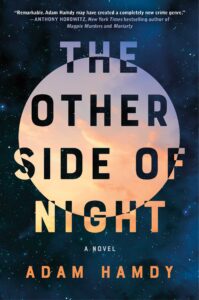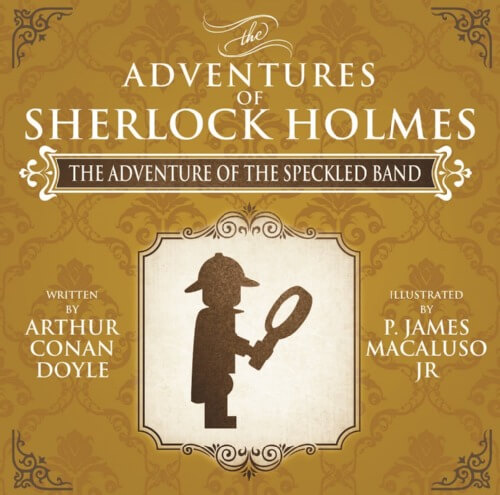
Can you tell us a little about your latest release “The Other Side of Night”?
The Other Side of Night follows Harriet Kealty, a disgraced former police officer who discovers a message written in an old library book. At a loose end in life, unable to shake the detective within, Harri takes the message ‘Help me. He’s trying to kill me,’ seriously, and her investigation leads her to Ben Elmys, an unusual man Harri once thought was the love of her life. She keeps pulling on the thread, and discovers Elizabeth and David Asha, the parents of Ben’s ward, Elliot Asha, died in suspicious circumstances. Suspecting Ben of murder, and worried about Elliot’s safety, Harriet’s investigation takes her places she could never imagine.
The Other Side of Night is a difficult book to pigeonhole. I can’t even explain the source of the difficulty without running the risk of ruining the reading experience. And it is an experience. Even now, on what must be my fiftieth reading of a book I’ve been thinking about for more than five years, the story moves me. It is a mystery, a love story, a coming of age tale, a work of speculative fiction, but at its heart it chronicles a family’s love.
What was the inspiration behind this novel?
Our middle child, Elliot, asked me a question when we were out for a walk in the Peak District. He was eight years old and the question was so touching and profound I knew instantly there was a great story in it. I can’t reveal the question because it’s a spoiler, but I got to work on the first iteration of The Other Side of Night immediately. It took me five years to get it into shape, but I think I’ve done justice to Elliot’s question. He’s certainly given the book a big thumbs up – although it did make him cry.
What was the process of intertwining three characters in one story?
A lot of planning. I wrote The Other Side of Night as a short story originally, then as a screenplay, then part of a book, then a screenplay again – it went through so many iterations and I didn’t realize what I was missing until I found it: perspective and voice. I needed David Asha, the storyteller, to elevate the book from a twisty procedural into something quite profound, and in doing that the structure revealed itself.
What drew you to the mystery genre?
I love mystery. I think the greatest novels feature mystery in one way or another. It is a vibrant genre that gives authors a brilliant way to explore social, political and personal themes. As a reader I love being hooked with a question and am desperate to get to the end of a good mystery to learn the answer.
You’ve said that events in some of your books are inspired by real events, was that the case for this novel?
The Other Side of Night was inspired by Elliot’s question and I found the perspective of David Asha through a chance real life encounter. I was teaching at a residential creative writing course in the Shropshire countryside and went for a walk in the hills during a break. I met a man walking a beautiful dog, and asked him about it. He told me it was his daughter’s dog and that she’d passed away the previous week. As he spoke about her, her husband and the two sons she’d left behind, I realized the grief he was experiencing was what was missing from The Other Side of Night. We talked for about 20 minutes, and I tried to console him as best a stranger can, and the moment I returned to my room, I wrote a letter as David Asha, and realized I’d found the voice I’d needed. I believe real life always informs authors’ works, which is why I try to live as interesting an existence as possible and meet and speak to people from all backgrounds.
What is something you want your readers to take away from the story?
Readers will see what they need in The Other Side of Night. If you want to be moved and consider life’s deep questions, the book offers that stimulation. If you just want an interesting and entertaining mystery, you’ll get that too. I’ve had messages from readers who say the book changed how they perceive their relationship with the world. I hope readers will be entertained, puzzled and then have that rush of excitement as they hit the big reveals. I hope the book stays with them and provokes thought long after they’ve put it down.
Have you ever experienced writer’s block? If so, what do you do to combat that?
No. The best way to combat writer’s block is to quit your job and become utterly reliant on writing as a source of income. Hunger ensures productivity. I couldn’t afford to have writer’s block, and now I’m just in the habit of writing. But if you do experience writer’s block, try writing a letter telling someone about the piece you’re working on. The key is to get your mind back into the rhythm of writing, and usually writing anything will help do that.
How has your career in film and screenwriting influenced your writing?
I’ve learned a great deal about the importance of structure and economy. One really has to focus on key beats in a screenplay, because no producer or studio is going to green light a film or TV show that’s carrying excess. Every moment counts, which doesn’t mean to say there has to be non-stop action, but it does mean when there are moments of calm or non-action, they have to contribute to the story.
What is your advice to aspiring writers?
Read widely. Fiction, non-fiction, across a range of genres. Go to writing conventions, listen to writing podcasts, learn what works for other people and adapt and apply things that will work for you. And live an interesting life and talk to as many fascinating people as possible. The world is full of inspiration.
What are you currently reading?
The Rum Diary by Hunter S Thompson. A friend gave it to me when we emigrated last year and I’ve only recently had the chance to get to it.
About the Author
Adam Hamdy is a Sunday Times and internationally bestselling author, along with being a screen writer. His work is often inspired by lived research, making some events in his stories based on real-life experiences. A nature lover, Adam enjoys rock climbing, skiing, sailing and competitive shooting. Adam lives in Mauritius with his wife and their three children.

